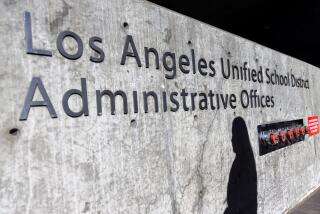Top-Secret Nuclear Lab Will Welcome Students
- Share via
LIVERMORE, Calif. — The squat beige buildings in this Bay Area suburb contain some of the most secretive nuclear weapons research on the planet. But come January, officials here will start sharing information with a special class of scholars.
A group of plasma physicists, nuclear engineers and cyber-sleuths at Sandia National Laboratories will begin teaching courses leading to the nation’s first master’s degree in National Security and Public Safety.
The University of New Haven, a Connecticut school offering graduate course work in forensic science from a branch campus in Sacramento, will serve as the lab’s education organizer and authorizer.
Master’s program students -- many of whom already work at Sandia, at the adjacent Lawrence Livermore National Laboratory or as government contractors -- will receive the kind of practical, hands-on experience that research labs and intelligence agencies crave, proponents say.
Chuck Hartwig, Sandia’s group leader for information security, said Sandia is the target of more than 100 attacks on its computer network daily.
“We are the stewards of the nation’s nuclear weapons supply, and we need to understand these attacks,” Hartwig said.
“This is a program we have in place to provide expertise for the next generation to work in the Department of Defense, Sandia and the Department of Energy.”
Sandia is an Energy Department research center operated by the Lockheed Martin Corp. It has a large facility in Albuquerque and a smaller one in Livermore that supports the weapons work of the Lawrence Livermore lab. Sandia engineers design 97% of the 6,500 components in every nuclear weapon.
Students will sit down to banks of computer monitors in portable classrooms starting Jan. 6 and bring their own experience and skill to the national security issues of the day.
Of the 23 applicants accepted thus far, two have doctorates and 12 have master’s degrees, ranging from engineering and computer science to criminal justice and law, said New Haven Dean Paul Johnson.
Among the courses will be “Introduction to Practical Issues in Cryptography” and “Computer Viruses and Malicious Code.” Course work will focus on securing the homeland and combating bioterrorism and cyber-terrorism.
“Most of what will be taught will be open information,” said Sheryl Stewart, team leader of education and training at Sandia. “But when you put it together, it might be more privileged information.”
Because the nation is on high alert for terrorist attacks, Sandia will conduct background checks on prospective students, and only U.S. citizens will be admitted. Some scientific and intelligence experts say the degree offers the right exposure to the national laboratories’ scientific staff so they better understand the social issues underlying national security.
Chris Demchak, a professor of cyberspace policy at the University of Arizona and head of the International Security and Arms Control section within the American Political Science Assn., sees the citizenship requirement as a surrogate screening mechanism, which could protect the course material and participants.
“If you look at the course titles, they suggest some sensitive material will be taught and the folks are probably worried about re-creating the flying lessons fiasco of past years, where the 9/11 terrorists learned just enough to fly big jets into buildings,” Demchak said. “A potential attacker does not need to know how the whole system works, just where the cracks are, in order to gain advantage.”
But others question the decision to bar foreign nationals.
Louise Comfort, a professor of organizational theory and crisis management at the University of Pittsburgh, suggested that the policy sends the wrong message to foreign nationals.
“They are using U.S. citizenship as a filter for loyalty,” Comfort said. “The balance between security and civil liberties is difficult. But blanket categorization is a poor way to go. It’s the worst kind of profiling imaginable.”
One master’s student is John Berry, a 45-year-old video conferencing manager at Sandia. He has a bachelor’s degree in computer science from Cal State Hayward and plans to remain at Sandia after the course.
“Certainly at Sandia it has a minimal short-term impact,” Berry said. “But long term, the degree -- with all the hoopla around the homeland defense stuff -- it seems to be where the country is going.”
More to Read
Sign up for Essential California
The most important California stories and recommendations in your inbox every morning.
You may occasionally receive promotional content from the Los Angeles Times.











